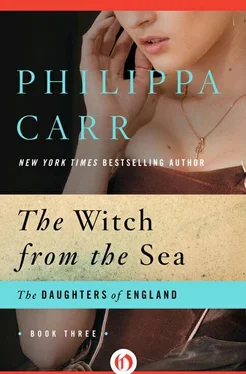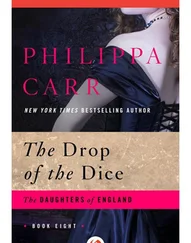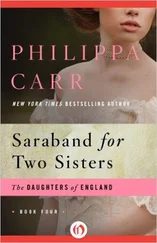“You forget I am the one who does the bewitching.”
“So it is he who is bewitched by you.”
“I think that in spite of his new puritan ideas, he is a little. For I am a very bewitching person, Tamsyn.”
“In your own opinion, certainly.”
“It is so interesting,” she said, “and so dangerous . It has been since the Hampton Court Conference.”
“Keep away from religion that is dangerous.”
“What a thing to say! Surely that is quite cynical. How can people help what they believe, and if you believe, shouldn’t you defend that belief with your life if need be?”
“Our country and my family have been torn by religious beliefs. One of my ancestors lost his head in the reign of Henry VIII, another was burned at the stake in the reign of Mary. We don’t want any more religious conflict in the family.”
“You’re a coward, Tamsyn.”
“That may be but that is how I want it.”
“They are talking of going away.”
“Who, Dickon and the Deemsters?”
“Yes, to Holland. They can worship there as they wish. Perhaps one day they will go far away and make a land of their own. They talk about it a good deal.”
I laughed.
“What amuses you?”
“That you, Senara, of all people, should be caught up with puritans. Of course it is not the puritans, I know. Can it really be Dickon?”
“How could it be? I would never be allowed to marry a man who was our music master and now grows vegetables and works for a family like the Deemsters.”
“I cannot see you in the humble role of wife to a man in such a lowly position.”
“Nay, nor could I. For I came from such nobility that is far beyond anything I have had here.”
“Oh, how do you know this?”
“My mother has told me. In Spain she moved in very noble circles—royal, in fact. So you are right when you say I could not marry Dickon.”
“Don’t look sad. It’s the first day of Christmas. We shall make merry this night. You will dance and sing for the company and no one will be merrier than you.”
“It will be a very different Christmas at Leyden Hall,” she said.
“I can picture it. They will make of it a purely religious occasion. There will be no feasting, dancing and making merry, as we do, no King for the Night, no blessing on the hall, no mummers, no carol singers. This is more to your taste, Senara.”
“It is!” she cried; and that night she was beautiful in a blue velvet gown, her dark hair caught back in a gold band,
I was not the only one who thought her the loveliest of all present. There were several young men who did and would doubtless in due course ask for her hand, which was what her mother wanted.
There was Thomas Grenoble for one, who came from London and was connected with the Court. He was young, rich and good-looking. I knew he was one my stepmother had chosen for Senara. He could do the latest dances which she quickly mastered and I wondered whether as she danced with Thomas Grenoble she thought of Dickon. If she did she gave no sign of it.
Melanie had been brought up by her mother to be a good housewife and I don’t think our household matters ever went so smoothly as they did that Christmas. Melanie was quite unobtrusive and gentle; Connell was inclined to ignore her and flirt with some of the young women guests, but Melanie remained unruffled. She reminded me very much of Fenn and how I wished that he were with us!
I mentioned him to her and asked if she had heard from her mother when he was expected back.
“It was not to be a long voyage,” she answered. “My mother thinks he will be back by the spring.”
That gave me new hope. I was just waiting for the spring.
I was still looking for my mother’s diary and when it seemed that I had looked in every possible place I began to think that it had never existed. Jennet was known to exaggerate, to romanticize, particularly now that she was getting older. Had she seen my mother writing once or twice and imagined she had been writing something which she wanted to hide? That seemed very likely.
And my mother’s death? People did die suddenly when they were not very old. One heard of them now and then and no one was skilled enough in medicine to know the cause. If one was in Court circles and known to have enemies people thought of poison. I wondered how many men and women had been believed to be poisoned when they had died of natural causes.
Then on some days my feelings would change and I would be certain that my mother had not died naturally. I could not forget the stone I had found on her grave. And who could have removed it from the cupboard in which I had placed it?
That was what had started my speculations. It was certainly mysterious. My mood fluctuated. At times I would think it was nonsense; then at others the certainty that my mother had not died naturally would be with me. Then I would start to look again for the journal, for if there was a secret would it not be in that? But if she had not known she was about to die how could it have been! But had she known? Why should she have been afraid during those last days of her life?
It would be in the book and if that book existed it must be in the castle.
I could think of nowhere in her sitting-room where it could be. I had searched that and the settle had yielded nothing. In the bedroom which she had shared with my father and was now that of him and stepmother? That had been refurbished after my mother’s death. Surely if the book had come to light it would have been mentioned—or destroyed perhaps.
It was all mysterious and long ago. Yet at times the urge to discover that book came back strongly to me.
There were turret rooms in the towers of both Nonna and Crow where perhaps something could be hidden. In one of my exploratory moods I decided to look.
In those rooms there were some very old pieces of furniture, among them several stools and a table and a pallet or two. The stools were interesting because they were made like boxes and articles could be stored under where one sat.
When I was in the turrets with their long narrow windows I was always fascinated to look out to sea and my eyes invariably came to rest on the jagged rocks of the Devil’s Teeth. A gruesome sight! I was not surprised that they were said to be haunted.
These rooms were used fairly frequently, for high in the walls of those facing the sea were windows in which lanterns hung. They were reached by step-ladders which were kept in each room so that they could be easily reached. The lanterns had been hanging there for many years and had been placed there by one of my ancestors. He was known as Good Casvellyn in contrast, I had heard, to so many of the family who were far from good. The Devil’s Teeth had always been responsible for a good share of wrecks along our coast and Good Casvellyn had had the idea that if he carefully placed lighted lanterns in the top of his towers of Nonna and Seaward, it was possible that they could be seen some way out to sea and the sailors who saw them would know they were close to the treacherous Devil’s Teeth. Therefore they would steer clear of them.
I liked to think that the kindly action started by Good Casvellyn had saved the lives of sailors. Of course it often happened that in spite of the lights there were disasters on the rocks.
I was always anxious when I heard the wind rising and the spring tides were up and there was a storm at sea. How many ships had foundered on that grinning mouth? I imagined that many a sailor who was unsure of his whereabouts and saw the lights in Nonna and Seaward Towers blessed Good Casvellyn for his lights.
It was the duty of one of the men from Seaward to make sure that each night they were shining out to sea.
I had searched everywhere in the tower rooms at Nonna’s. I examined the stools with the greatest care because I suspected that in one of them there must be a secret compartment.
Читать дальше












